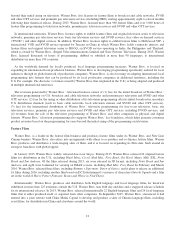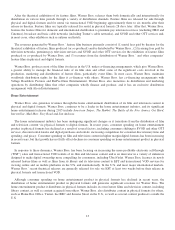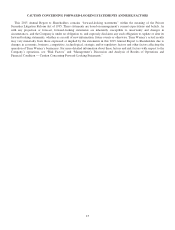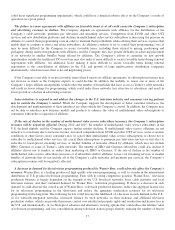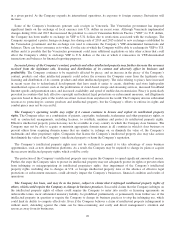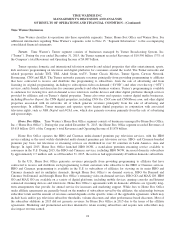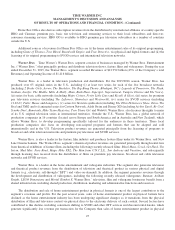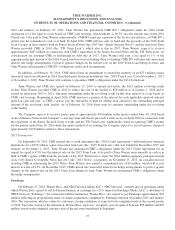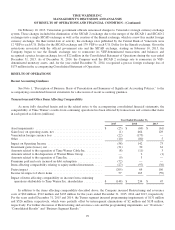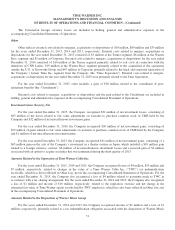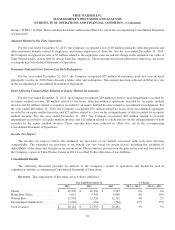Time Magazine 2015 Annual Report Download - page 36
Download and view the complete annual report
Please find page 36 of the 2015 Time Magazine annual report below. You can navigate through the pages in the report by either clicking on the pages listed below, or by using the keyword search tool below to find specific information within the annual report.Service disruptions or the failure of communications satellites or transmitter facilities relied on by the Company could
have a negative impact on the Company’s revenues. Turner and Home Box Office rely on communications satellites and
transmitter facilities to transmit their programming to affiliates and other distributors. Shutdowns of satellites and transmitter
facilities or service disruptions pose significant risks to the Company’s operations. Such disruptions may be caused by power
outages, natural disasters, extreme weather, terrorist attacks, failures or impairments of communications satellites or on-
ground uplinks or downlinks used to transmit programming, or other similar events. If a satellite is not able to transmit the
Company’s programming, the Company may not be able to secure an alternative communication satellite in a timely manner,
because there are a limited number of communications satellites available for the transmission of programming. If such an
event were to occur, there could be a disruption in the delivery of the Company’s programming, which could harm the
Company’s reputation and adversely affect the Company’s results of operations.
The Company’s businesses are subject to regulation in the U.S. and internationally, which could cause the Company to
incur additional costs or liabilities or disrupt its business practices. The Company’s businesses are subject to a variety of
U.S. and international laws and regulations. The Company could incur significant costs to comply with new laws or
regulations or changes in interpretations of laws or regulations or substantial penalties or other liabilities if it fails to comply
with them. Compliance with new laws or regulations also could cause the Company to change or limit its business practices
in a manner that is adverse to its businesses. In addition, if there are changes in laws or regulations that provide protections
that the Company relies on in conducting its businesses, these changes could subject the Company to greater risk of liability
and could increase compliance costs or limit the Company’s ability to operate certain lines of business.
The Company’s enterprise efficiency initiatives present various risks, including the risk that the Company may not
realize the financial and strategic goals relating to the initiatives. The Company has multi-year enterprise efficiency
initiatives underway to deliver certain business support services (e.g., real estate and certain information technology
functions) centrally to the Company’s divisions. The Company may incur greater than anticipated expenses in connection
with these initiatives, fail to realize anticipated benefits, experience business disruptions or have difficulty executing the
initiatives.
If the separation of any of Time Inc., AOL Inc. (“AOL”) or Time Warner Cable Inc. (“TWC”) is determined to be
taxable for income tax purposes, Time Warner and/or Time Warner’s shareholders who received shares of Time Inc.,
AOL or TWC (as applicable) in connection with the respective spin-off of those companies could incur significant income
tax liabilities. In connection with the separation from the Company of (i) Time Inc. in June 2014 and (ii) AOL in December
2009, Time Warner received an opinion of counsel confirming that the applicable separation transaction should not result in
the recognition, for U.S. Federal income tax purposes, of gain or loss to Time Warner or its shareholders, except to the extent
of cash received in lieu of fractional shares in such transaction. In connection with the separation of TWC from the Company
in March 2009, Time Warner received a private letter ruling from the Internal Revenue Service (“IRS”) and opinions of
counsel confirming that the TWC separation should not result in the recognition, for U.S. Federal income tax purposes, of
gain or loss to Time Warner or its shareholders, except to the extent of cash received in lieu of fractional shares. The IRS
ruling and the opinions of counsel in connection with these transactions were based on, among other things, certain facts,
assumptions, representations and undertakings that were made by Time Warner and Time Inc., AOL or TWC, as applicable,
in connection with the applicable separation transaction. If any of these facts, assumptions, representations or undertakings is
incorrect or not otherwise satisfied, Time Warner and its shareholders may not be able to rely on the IRS ruling (in the case
of the TWC separation transaction) or opinion and could be subject to significant tax liabilities. Furthermore, opinions of
counsel are not binding on the IRS or state or local tax authorities or the courts, and a tax authority or court could determine
that one or more of the separation transactions should be treated as a taxable transaction. Time Warner is entitled to
indemnification from Time Inc., AOL and TWC for taxes resulting from the failure of the applicable separation transaction
to qualify as tax-free as a result of (i) certain actions or failures to act by the former subsidiary or (ii) the failure of certain
representations made by the former subsidiary to be true. However, if transaction taxes are incurred for other reasons, Time
Warner would not be entitled to indemnification.
22


